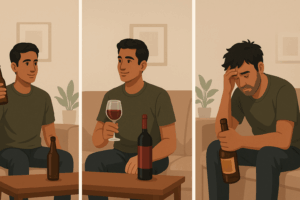Allostasis and Addiction: Why It’s So Hard to Quit Alcohol and Other Substances
 Introduction
Introduction
If you’ve ever wondered why quitting alcohol, nicotine, cannabis, or any addictive substance feels so overwhelmingly difficult, the answer lies deep within how the brain adapts to chronic stress and pleasure.
This biological process is called allostasis — and understanding it can completely change how we view addiction and recovery.
Addiction is not simply about “bad habits” or “lack of willpower.”
It is about how the brain’s normal settings get reprogrammed after repeated exposure to addictive substances.
What Is Allostasis?
Allostasis comes from the Greek words “allo” (meaning “variable” or “different”) and “stasis” (meaning “stability”).
It refers to how the body maintains stability through change — constantly adjusting to stress, challenges, and environmental shifts to keep us functioning.
For example:
-
When you exercise, your heart rate and breathing increase — that’s allostasis at work.
-
When you’re under stress, your body releases cortisol to cope — another example of allostasis.
In short, allostasis is the body’s dynamic process of adapting to stressors to maintain balance.
Allostasis and the Brain’s Reward System
When alcohol or any addictive drug is repeatedly used, it hijacks the brain’s reward system — particularly areas like the:
-
Nucleus Accumbens
-
Amygdala
-
Prefrontal Cortex
-
HPA Axis (Hypothalamic–Pituitary–Adrenal Axis)
Initially, substances like alcohol trigger a surge of dopamine — the “pleasure chemical.”
But with repeated use, the brain undergoes allostatic changes:
-
It lowers baseline dopamine levels.
-
It raises the threshold needed to feel pleasure.
-
It activates stress circuits even in the absence of the substance.
Thus, over time, a person feels “normal” only when using alcohol — and experiences a profound sense of dysphoria, anxiety, and emotional pain when not using it.
Why Is It So Hard to Leave Alcohol or Addictive Substances?
Because the brain’s new “set point” has shifted.
1. Pleasure Deficit
-
Natural rewards (like food, social connection, hobbies) feel blunted or meaningless.
-
Only alcohol or the addictive substance seems capable of producing temporary relief or pleasure.
2. Stress Surplus
-
Even mild daily stress feels overwhelming.
-
Without the substance, the brain’s stress system remains hyperactivated — leading to irritability, anxiety, depression, and emotional pain.
3. Craving and Compulsion
-
Environmental cues (e.g., seeing a drink, passing a bar, meeting old friends) trigger intense cravings via conditioned learning.
-
These cravings are not just psychological — they are neurobiological survival signals, hardwired into the brain’s new allostatic set point.
4. Fear of Withdrawal
-
Withdrawal symptoms are not only physically uncomfortable (tremors, sweating, nausea) but also emotionally terrifying (panic, hopelessness, agitation).
-
The brain remembers the discomfort and subconsciously motivates returning to alcohol to avoid suffering.
Allostatic Load in Addiction
The concept of allostatic load refers to the wear and tear on the body and brain caused by chronic stress adaptation.
In addiction:
-
Emotional resilience decreases.
-
Physical health declines (hypertension, immune dysfunction, sleep problems).
-
Cognitive flexibility reduces, making decision-making and impulse control worse.
Thus, over time, addiction is no longer about seeking pleasure —
It becomes about avoiding pain and surviving moment to moment.
Hope: Allostasis Can Heal
The powerful truth is:
The brain is plastic. Healing is possible.
-
With sustained abstinence, therapeutic interventions, and stress management, the brain’s set points begin to slowly reset toward healthier functioning.
-
Natural dopamine sensitivity improves.
-
Stress circuits recalibrate.
-
Emotional stability strengthens.
However, this healing process can take weeks to months — which is why structured rehabilitation, therapy, medication support, and compassionate guidance are so crucial.
Conclusion: Addiction Is Adaptation, Not Moral Failure
Understanding allostasis reveals that addiction is the brain’s adaptive survival strategy — not a personal flaw.
Quitting alcohol, tobacco, cannabis, or any drug is not simply a matter of “saying no.”
It involves retraining the brain, rebuilding emotional resilience, and resetting biological systems — step by step, with expert support.
At our center in Chennai, led by Dr. Srinivas Rajkumar T, MD (AIIMS, New Delhi), we offer personalized deaddiction programs based on the science of brain recovery, emotional healing, and resilience-building.
📞 Appointments: 8595155808
🌐 Website: srinivasaiims.com